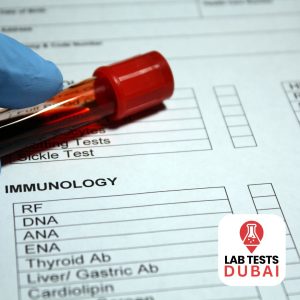
Growth Hormone – 1 Hour
210,00 د.إ
The Growth Hormone 1 Hour lab test is a specialized diagnostic tool designed to measure the levels of growth hormone (GH) in your blood.
Sample Type : Serum
Methodology : Chemiluminescence
TAT : 2 Days
Description
Growth Hormone – 1 Hour Lab Test – Accurate Hormone Level Testing for Pituitary & Metabolic Health
The Growth Hormone (GH) – 1 Hour Lab Test from Lab Tests Dubai is a specialized blood test that measures growth hormone levels at a specific time—often used as part of a dynamic pituitary evaluation to assess abnormal GH secretion.
Produced by the anterior pituitary gland, growth hormone (GH) regulates:
- Growth in children and adolescents
- Muscle mass, fat metabolism, and bone density in adults
- Cellular repair and energy levels
While GH is released in pulses (especially during sleep), a single random or timed GH level—such as a 1-hour post-fasting or post-stimulation sample—can provide critical clues when interpreted with IGF-1 levels and clinical symptoms.
This test is essential for:
- Evaluating suspected acromegaly (excess GH in adults)
- Investigating growth failure in children
- Assessing adult growth hormone deficiency (AGHD)
- Monitoring pituitary tumors or dysfunction
- Supporting diagnosis after abnormal imaging (pituitary MRI)
Using high-sensitivity chemiluminescence technology, this serum-based test delivers accurate results within 2 days, helping endocrinologists diagnose complex hormonal disorders.
Available with home blood collection, Lab Tests Dubai ensures fast, accurate, and stress-free testing—so you can get answers without disruption to your care.
Why You Need This Test
If you’re experiencing unexplained growth issues, fatigue, or physical changes, this test could reveal a pituitary imbalance.
You need the GH – 1 Hour Test if:
- You have acromegaly symptoms: enlarged hands/feet, jaw protrusion, thick skin
- You’re a child with short stature or delayed growth
- You have pituitary disease (tumor, surgery, radiation)
- You’re being evaluated for hypopituitarism
- You have low IGF-1 levels on prior testing
- You’re undergoing GH stimulation or suppression testing (as part of a panel)
Note: A single GH level is not diagnostic—it must be paired with:
- IGF-1 (best screening test)
- Oral glucose suppression test (for acromegaly)
- Stimulation tests (e.g., insulin tolerance test) for deficiency
This test is often the first step in a larger pituitary workup.
Symptoms That Indicate This Test
Consider the GH Test if you experience:
✅ For Excess GH (Acromegaly):
- Enlarged hands and feet
- Coarsened facial features (protruding brow, enlarged nose)
- Joint pain or carpal tunnel syndrome
- Thick, oily skin
- Snoring or sleep apnea
- Headaches or vision changes (pituitary tumor)
✅ For GH Deficiency (Children):
- Slow growth or short stature
- Delayed puberty
- Fatigue, poor concentration
- Increased body fat
✅ For GH Deficiency (Adults):
- Low energy, depression
- Reduced muscle mass, increased abdominal fat
- Poor exercise tolerance
- Low bone density (osteoporosis)
✅ For Pituitary Issues:
- History of brain injury, tumor, or radiation
- Low testosterone, cortisol, or thyroid hormones
These signs may point to pituitary dysfunction—and this test helps initiate the diagnostic journey.
Natural Production: How Growth Hormone Regulates Body Function
GH is released by the anterior pituitary in pulses, primarily during deep sleep, exercise, and stress.
It works by:
- Stimulating the liver to produce IGF-1 (Insulin-like Growth Factor 1)
- Promoting protein synthesis, lipolysis, and insulin resistance
GH secretion declines with age—peaking in adolescence, dropping by ~14% per decade.
Normal Random GH Levels:
- <5 ng/mL in adults (but highly variable)
- Higher in children (up to 10–20 ng/mL)
IGF-1 is the preferred screening test because it:
- Reflects average GH exposure over days
- Is stable throughout the day
Elevated GH + IGF-1 → Acromegaly (usually due to pituitary adenoma)
Low IGF-1 + symptoms → GH deficiency (pituitary or hypothalamic)
This test is often paired with IGF-1, prolactin, and pituitary MRI.
What Happens If Untreated? Risks of Ignoring GH Imbalance
Ignoring abnormal GH levels can lead to:
⚠️ Acromegaly Complications – heart disease, diabetes, arthritis, sleep apnea
⚠️ Untreated Pituitary Tumors – vision loss, hormone failure
⚠️ Growth Failure in Children – psychosocial impact, short stature
⚠️ Metabolic & Cardiovascular Risk – from long-term GH excess or deficiency
The good news? Most cases are treatable with:
- Surgery (transsphenoidal resection of pituitary tumor)
- Medications (somatostatin analogs, GH receptor antagonists)
- GH replacement (for deficiency, under strict supervision)
Early testing = better outcomes and quality of life.
How to Prepare for the Test
To ensure accurate results:
✅ Fast for 8–12 hours (overnight fast) – especially if part of a suppression test
✅ Avoid exercise, stress, or sleep deprivation the night before
✅ Inform your doctor of:
- Pituitary or hormone medications
- History of diabetes or seizures
- Recent illness or surgery
✅ For dynamic testing (e.g., glucose suppression), follow strict timing instructions
A serum blood sample is collected via standard draw—available at our labs or via home collection.
Test Overview: High-Sensitivity Chemiluminescence Method
Important Notes:
- Random GH alone is not diagnostic due to pulsatile secretion
- Always interpret with IGF-1 levels
- For acromegaly: GH should suppress to <1 ng/mL after 75g glucose (OGTT)
- For deficiency: Stimulation tests (ITT, GHRH+arginine) are diagnostic
Results are reported with clinical notes for your endocrinologist.
Benefits of the Growth Hormone Blood Test
🔹 Early Detection of Acromegaly
Catch pituitary tumors before they cause irreversible changes.
🔹 Growth Assessment in Children
Identify causes of short stature and guide treatment.
🔹 Metabolic & Energy Insight
Understand fatigue, weight gain, and low muscle mass.
🔹 Pituitary Health Monitoring
Track recovery after surgery or radiation.
🔹 Support for IGF-1 Abnormalities
Confirm or rule out GH imbalance.
If you’re tired of unexplained fatigue, growth issues, or physical changes, the Growth Hormone (GH) – 1 Hour Test gives you the answers you need in just 2 days.






Reviews
There are no reviews yet.